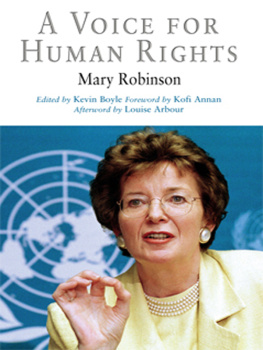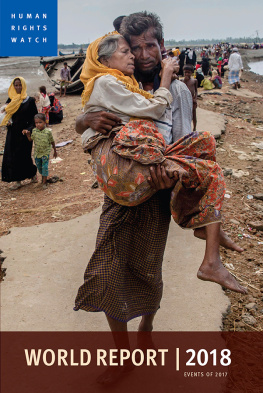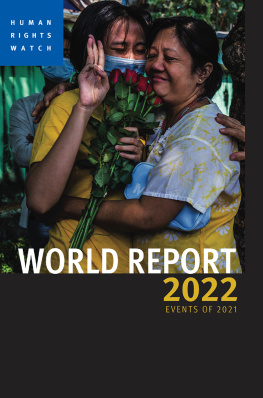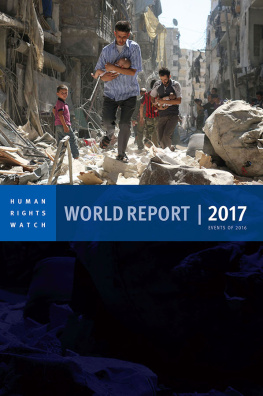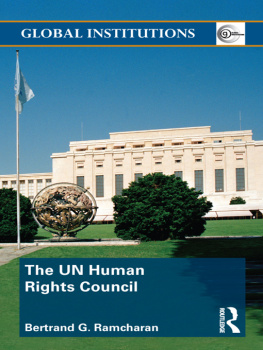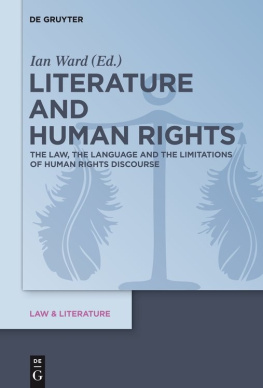A Voice for Human Rights
MARY ROBINSON
EDITED BY KEVIN BOYLE
FOREWORD BY KOFI ANNAN
AFTERWORD BY LOUISE ARBOUR
PENN
University of Pennsylvania Press
Philadelphia
PENNSYLVANIA STUDIES IN HUMAN RIGHTS
Bert B. Lockwood, Jr., Series Editor
A complete list of books in the series is available from the publisher.
Copyright 2006 University of Pennsylvania Press
All rights reserved
Printed in the United States of America on acid-free paper
10 9 8 7 6 5 4 3 2 1
First papeback edition 2007
Published by
University of Pennsylvania Press
Philadelphia, Pennsylvania 19104-4112
Library of Congress Cataloging-in-Publication Data
Robinson, Mary, 1944
A voice for human rights / Mary Robinson ; edited by Kevin Boyle ;
foreword by Kofi Annan ; afterword by Louise Arbour.
p. cm. (Pennsylvania studies in human rights)
Includes bibliographical references
ISBN-13: 978-0-8122-2007-0 (pbk. : alk. paper)
ISBN-10: 0-8122-2007-2 (pbk. : alk. paper)
1. Human rights. 2. United Nations. Office of the High Commissioner for Human Rights. 3. Globalization. I. Boyle, Kevin. II. Title. III. Series.
JC571.R653 2006
323dc22
2005042338
Frontispiece: Mary Robinson, UN High Commissioner for Human Rights,
19972002
Foreword
The job of United Nations High Commissioner for Human Rights is not for the faint of heart. At times even well-behaved Governments view the occupant of the post as something of a nuisance, while those with something to hide will often denounce the High Commissioners efforts as unwarranted attacks on national sovereignty. Civil society organizations, meanwhile, often expect miraclesas though the policies of hard-bitten dictators could be changed overnight by confrontational public comments, or for that matter by hidden persuasion, from an official whose power is entirely of the soft variety. And as if this wasnt enough, the High Commissioner must also run a sizable administration and navigate the political minefields associated with the Commission on Human Rights and its wide-ranging mechanisms. Equal parts lawyer and teacher, prosecutor and witness, hard talk and soft shoulder, the job, though little more than a decade old, is one of the most important in the entire United Nations system.
It was the need for such a forceful combination of qualities that led me, in 1997, to ask Mary Robinson to take it on. I was familiar with her distinguished career in Ireland as a lawyer and womens rights advocate. Her visits, as President of her country, to Somalia and Rwanda had coincided with my own efforts, in the United Nations Department of Peacekeeping Operations, to resolve the conflicts and alleviate the suffering in those countries. I was moved by her concern for the victims of violence. When I later sought someone to serve as High Commissioner for Human Rights, I remembered the eloquent compassion she had shown. Along with human rights advocates around the world, I was delighted when she agreed to take up this challenge.
My faith in her proved well founded. She brought to the task a leaders vision, a lawyers precision, and a believers conviction. Whether talking to Government officials or to the victims of violations, in large meetings or in more intimate settings, she was able to convey the very essence of human rights. She focused renewed attention on neglected issues such as economic and social rights and the right to development. She inspired her staff to new levels of accomplishment. And she never shied away from controversial issues. Hers was a clear voice for human rights where a clear voice was needed.
That singular voice resonates in the speeches and statements reproduced in this book. Steeped both in history and in the daily lives of todays oppressed, it reminds us why human rights matter and shows how a High Commissioner can make a difference. These speeches are her thoughts alone, in her own voice, but they challenge all of us to be less apathetic, more curious about the fate of others, and more engaged.
When Mary left the United Nations in 2002, she left the world a better place than she had found it. And her work for the cause of human rights continues. I hope this collection will reach the wide global audience it deserves.
Kofi Annan
United Nations Secretary General
Introduction
Mary Robinson, former President of Ireland and an outsider to the United Nations, was its High Commissioner for Human Rights from September 1997 to September 2002, a period of five years. She was the second individual to be the principal officer for human rights in the United Nations. The first High Commissioner was Jos Ayala-Lasso (199497), a United Nations diplomat, who left the post to return to Ecuador as Foreign Minister. The third, Sergio Vieira de Mello, a highly experienced and highly regarded United Nations career official, was appointed in September 2002. He had served but eleven months before he was killed in a bomb attack on the United Nations headquarters in Baghdad. In July 2004 a new High Commissioner, Louise Arbour, former Canadian Supreme Court judge and prosecutor at the United Nations Ad Hoc Tribunals in The Hague and Arusha, took up the post.
The post of United Nations High Commissioner for Human Rights is therefore little more than ten years old. Mary Robinsons five years in the position were its formative years to date. Hers became one of the most influential voices on human rights of the last decade. The purpose of this book, which brings together a range of her addresses, speeches, and statements along with linking commentary, is to provide a systematic record of, and context for, the ideas, policies, campaigns, and initiatives so energetically pursued over that period by Mary Robinson and the staff she inspired. Such a collection will serve to honor the signal contribution she made as High Commissioner to the cause of universal human rights. But it will also, it is hoped, serve as an introduction to the international human rights cause and how that cause continues to be pursued inside and outside the United Nations.
This book is not a biography. Rather, it is an effort to tell the story of her five years in this important position through her own words. The texts of statements made, speeches delivered, and messages sent are a powerful historical resource in seeking to offer such an account. They cannot, however, capture the entire story. As High Commissioner, Mary Robinson traveled continuously, and in her meetings with victims of human rights violations and with local human rights defenders in many countries, she delivered numerous memorable and empowering messages that were by their nature unscripted and unrecorded. She was at her best without a script, speaking from the heart. Nevertheless, even though the bias in this selection of texts is to the formal record, her deep commitment to making a difference in the lives of ordinary men, women, and childrenoften the victims of conflict and violence, discrimination and abuseshines through.
Her words assembled in this book are not simply from the archives of what has passed. They also remain relevant to the present and the future. That is because the mission of securing universal respect for human rights is a long-term project. Steps that have been taken and milestones reached in that mission are never defunct history. They remain part of a story that stretches back to the founding of the United Nations and are part of the context for todays efforts to advance further. It is striking how frequently Mary Robinsons speeches invoke the past, understood in these terms. Eleanor Roosevelts injunction that the Universal Declaration of Human Rights 1948 must be heard in small places, close to home was a favorite quotation, for example. The position of High Commissioner rests, as does much else in contemporary human rights work, on the Vienna Declaration and Programme of Action of the World Conference on Human Rights of June 1993. This high point of international consensus after the Cold War led to indispensable understandings on the nature of human rights and the legitimacy of international concern over their violation. The World Conference documents figured prominently and inevitably in many of Mary Robinsons speeches.

